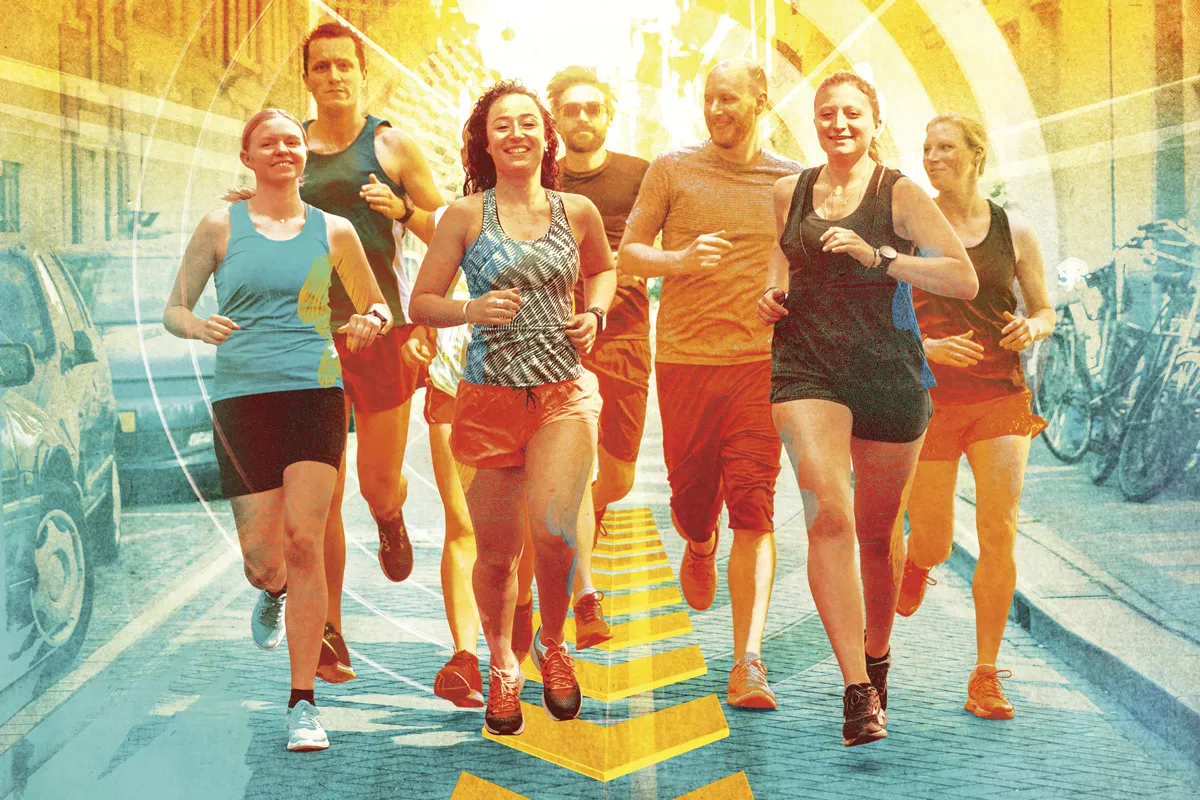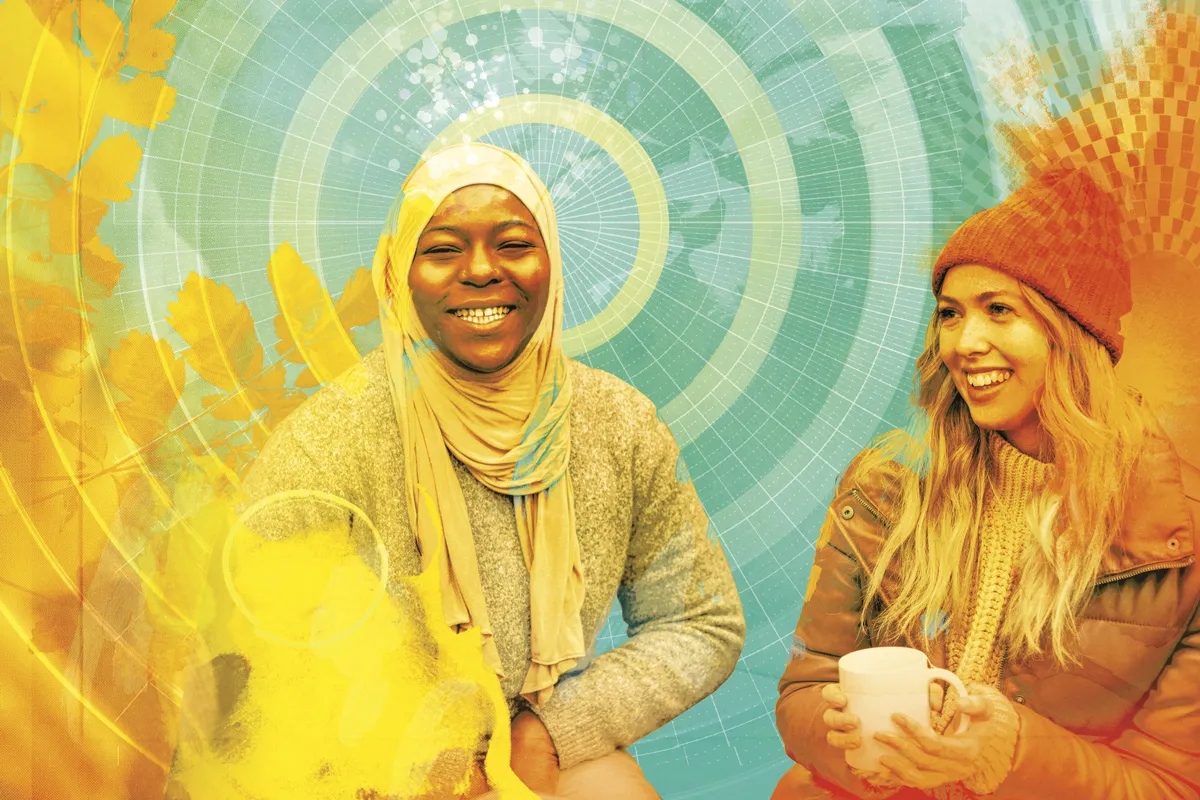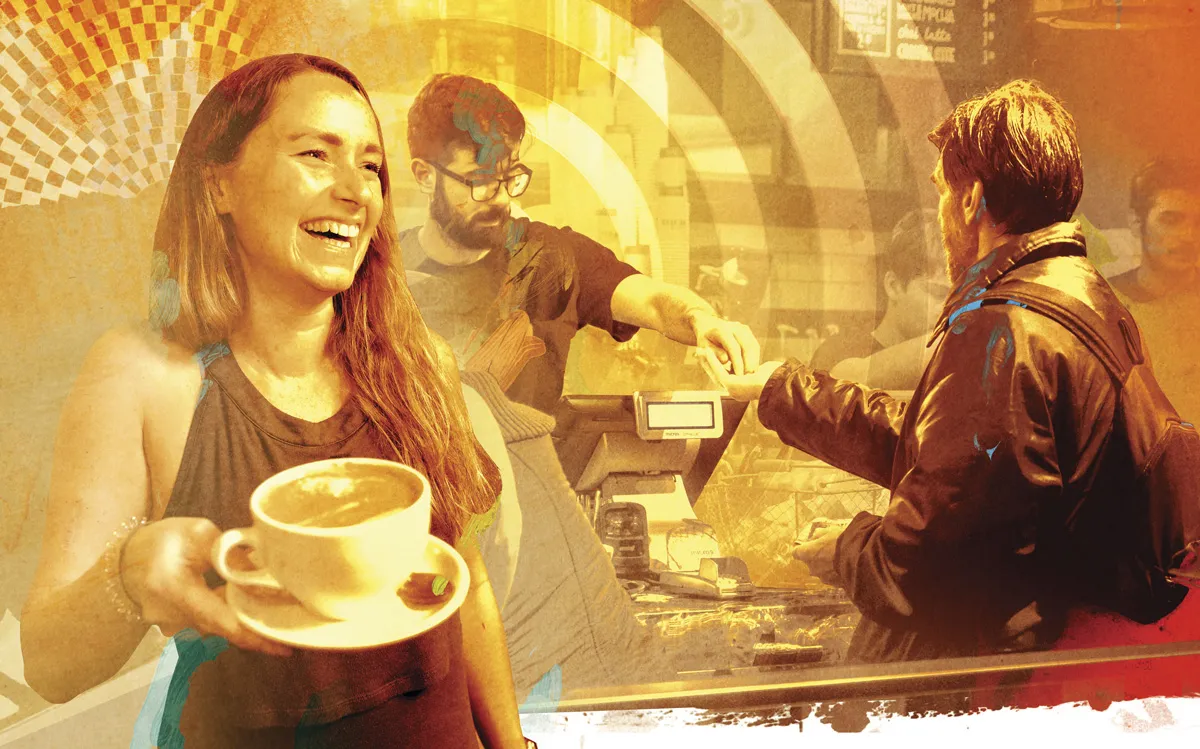Dr Gillian Sandstrom was at the opera when she realised how good she had become at talking to strangers. A woman with Parkinson’s was feeling anxious and needed an aisle seat and when Sandstrom noticed what was happening, she asked a whole row of people to move along to make room for the woman and her husband.
“As the couple moved past me the husband said, ‘Thank you so much, I could never have done that,’ and I thought to myself, ‘past-Gillian couldn’t have done that either’,” she says. “But now, it’s not a big deal.”
For Sandstrom, a senior lecturer in the psychology of kindness at the University of Sussex, talking to strangers didn’t always come naturally. But her research looks at the benefits of those small, day-to-day interactions and so, over the course of her career, she has had plenty of practice.
Now, it’s a skill she’s glad she cultivated. “I would feel like a hypocrite if I didn’t talk to strangers, so I do it a lot,” she says. “The biggest benefit is I’m just not nervous about other people anymore.”
What exactly is social fitness?
We all know that a balanced diet and exercise are important parts of staying healthy. But a growing body of research is showing that there’s another factor that’s even more important for keeping us in good shape, both physically and mentally: our social connections.
A landmark study published in 2010 found that the quality of someone’s relationships is a bigger predictor of early death than obesity and physical inactivity, and on a par with smoking and alcohol consumption.
“The size of these effects really can’t be overstated, they’re enormous,” says Tegan Cruwys, an associate professor and clinical psychologist at the Australian National University.
Of course, it isn’t just our physical health that suffers from lack of social connections. Other research shows that having a strong romantic relationship leads to better mental health and that feeling connected to others decreases symptoms of depression, mitigates symptoms of post-traumatic stress disorder and improves overall mental health.
But while we might have reluctantly come to accept that a regular physical fitness regime is required to maintain a healthy body, it can be easy to sink into the assumption that our relationships will maintain themselves.
Research shows that that’s not true: we should all be thinking as much about social fitness as we do about physical fitness.

Robert Waldinger, professor of psychiatry at Harvard Medical School, runs the Harvard Study of Adult Development, a decades-long study on health and wellbeing.
“What we found was that perfectly good relationships will often wither away from neglect and that the people who were best at having vibrant social networks were the people who took care of them, the people who were actively maintaining their connections with other people,” he told the BBC Science Focus Instant Genius podcast.
“That’s why we coined the term 'social fitness', to be deliberately analogous with physical fitness.”
As part of the Harvard study, researchers asked participants to list who they could call during a middle-of-the-night emergency. Most wrote down several people but some participants couldn’t even list one.
The loneliness epidemic, in 5 key numbers
- 7 per centof adults in the UK say they don’t have any close friends.
- 18-24 is the age group that feels most lonely in the UK.
- 17 per centof people say they’re pleased when social plans get cancelled, but 36 per cent say they’re disappointed.
- 4.1 is the number of intimate relationships someone can maintain at once, according to work by emeritus professor of evolutionary psychology Robin Dunbar.
- 88 per centof adults in the UK say they can rely on people in their lives if they have a serious problem.
Not having that psychological safety net puts us in a vulnerable position. “When you’re lonely, you’re in a state of fight or flight all the time,” says Marisa G Franco, psychologist and assistant clinical professor at the University of Maryland, and author of Platonic. “It’s like putting your body under a chronic stress state.”
But social connections of all shapes and sizes contribute to our wellbeing. While a romantic relationship or close-knit group of friends might make us feel safe, the fleeting interactions we have with people we don’t know well can bring us a different kind of joy.
“They’re a source of spontaneity and novelty that we don’t get in the same way from our close relationships,” says Sandstrom.
For example, the questionnaire she used in her research showed that people who had a brief chat with a barista were happier than those who were as efficient as possible when buying their coffee.
“People are in a better mood when they have this little social interaction, they feel more connected to other people,” she says.
In fact, research shows that group-based social connections, rather than individual relationships, seem to be most important for our cognitive health.

There’s also research which shows that joining groups – such as belonging to a church or working in a community garden – can be an effective treatment for depression.
Following 4,000 adults in England over six years, Cruwys found that not only did joining a social group alleviate symptoms of depression and reduce the risk of relapse, it also protected against future depression.
The feeling of connection to others and the wider world appears to be the active ingredient that makes social connection so good for our wellbeing.
“We think that it’s actually these group ties, these social identities that are at the heart of why social connection is so important for health,” says Cruwys.
“While a one-on-one tie, a friendship, might be really nice and pleasant, and you might enjoy that time, it’s not changing how you see yourself in the way that being part of something bigger does.”
How to assess your own social fitness
The ideal social life will, of course, vary between people. So when it comes to assessing your own social fitness the key thing to consider is whether the connections you have at the moment are meeting your needs.
Do you have plenty of friends but lack that feeling of being connected to something bigger? Or are you heavily involved in your community, but long for a close friend to confide in?
If you do decide you need more friends, you should be prepared to make the first move.
“One problem with friendship is that we assume that it happens organically and it doesn’t in adulthood,” says Franco.
She recommends starting by reconnecting with someone from your past. “The most common reason friendships end is simply because we fall out of touch rather than because there’s any fundamental difference between us,” she says.
Read more:
- How loneliness is killing men
- People experience loneliness differently depending on their age
- Has modern society condemned humans to be lonely?
Alternatively, you could join a group or class that’s repeated at regular intervals over time. And simply by sticking with it for at least two months you can capitalise on something called the ‘mere exposure effect’, which is our tendency to like people who are familiar to us.
“At first, it’s going to be uncomfortable and awkward,” says Franco. “I think the problem we have is that we assume that it’s always going to be that way and we quit in that early phase.”
Sticking to a familiar routine is also a good way to form so-called ‘weak ties’ – social connections with people who are not quite strangers, but not (yet) friends either.

Head to the same café each Saturday afternoon or walk your dog on the same route each morning and you’ll likely start to see some familiar faces.
“When we’re in situations with other people, and we see those people again and again, we’re more likely to start up conversations with them, and some of those conversations are likely to deepen and perhaps eventually become friendships,” says Waldinger.
Why talking to strangers makes you happier
If setting out to make a new friend sounds too daunting, build your confidence by talking with strangers. Sandstrom ran a study that involved a scavenger hunt-style game where people had to find and speak to new people repeatedly.
“Over the course of the week, day by day, people got more and more confident in their conversational abilities,” she says.
But a week-long crash course in talking to strangers is not a social fitness requirement. Nor is the ability to join a new evening class for every day of the week.
“It’s not about the amount of contact we have with people, it’s much more about the quality of that contact and that sense of belonging that we derive from it,” says Cruwys.
“There are ways we can stay connected and feel that sense of belonging without having it take up a huge amount of our time.”
Digital technology can help – if you’re intentional about how you use it. Research shows that using social media to maintain existing relationships can reduce loneliness but if it displaces offline activities, it makes us more lonely.
Passive consumption – scrolling through feeds without interacting – might even trick us into feeling like we’ve ticked the social connection box, when we haven’t.
“It gives us a snack of connection so we don’t even realise how lonely we are,” says Franco.
Read more:
- The friendship paradox: You'll never be as popular on social media as your friends
- Parasocial relationships" When your favourite celebrities feel like friends
Of course, as with physical fitness, often there are forces beyond our control that make it harder to maintain social connections.
“The people who are most lonely in our society often have some real barriers to being connected,” says Cruwys, such as people with disabilities and those living in poverty.
By engaging in small acts to help bring about social connectivity, we could also end up helping people more in need than ourselves.
In Australia, a grassroots initiative called Neighbor Day involves people setting up community events such as jumble sales or street parties, or even just WhatsApp groups for their street.
Cruwys studied the impact this initiative had during a COVID-19 lockdown period, when people’s social lives were curtailed.
“We found that people who hadn’t been involved in Neighbor Day showed a decline in their wellbeing during that lockdown period, but people who had been involved in Neighbor Day didn’t,” she says.
Similarly, the act of talking with a stranger could put a spring in your step for the rest of the day – and do the same for the other person, too.
“This has a lot of benefits for you,” says Sandstrom. “But it’s also an act of kindness.”
How to get better at talking to strangers
Here are Dr Gillian Sandstrom's useful pointers for how to strike up a conversation with someone you don’t know…
Choose your target wisely
“Talking to someone with a dog or a baby is a little less scary somehow and it’s more acceptable,” says Dr Gillian Sandstrom. Plus, it gives you an instant conversation starter.
Select your topic
The weather is a classic conversation opener for a reason: it’s something we all have in common. The space you’re in is another potential opener.
“I often talk to people while I’m waiting in a queue because we’re waiting for the same thing, or I’ll talk to people sitting next to me at a concert or a show,” she says.
You can also point out something they might not have seen. “When the crocuses are starting to pop up in the spring, I might ask someone: ‘Oh, did you see the crocuses over there?”
Ask someone a question
At a coffee shop, you might ask the server what they recommend. Or simply tap into your own curiosity.
“I’ve been on the Tube and seen multiple people wearing the same T-shirt because they were doing some kind of race, so I asked about the T-shirt,” she says.
Don't expect the worst
These conversations tend to go a lot better than people expect.
“All the things that people worry about – and there are lots of things that people worry about – they just don’t really happen very often,” she says.
Plus, there’s something called the ‘liking gap’: research shows that, after a conversation, people tend to like us a lot more than we think they do.
About our experts
Dr Gillian Sandstrom is a senior lecturer in the psychology of kindness at the University of Sussex, where she studies the importance of social interactions. Her research has been published in journals including the Social And Personality Psychology Compass, Scientific Reports and PLoS ONE.
Dr Tegan Cruwys is an associate professor and clinical psychologist at the Australian National University, where she studies clinical and counselling psychology. Her work has been published in journals including the Journal of Environmental Psychology and Social Science and Medicine.
Prof Robert Waldinger is a clinical professor of psychiatry at Harvard Medical School and Director of the Harvard Study of Adult Development, the world’s longest-running study on happiness.
Dr Marisa G Franco is a psychologist and assistant clinical professor at the University of Maryland, where she teaches courses on loneliness and friendship. She is the author of the friendship guide Platonic: How Understanding Your Attachment Style Can Help You Make And Keep Friends.
Read more:

